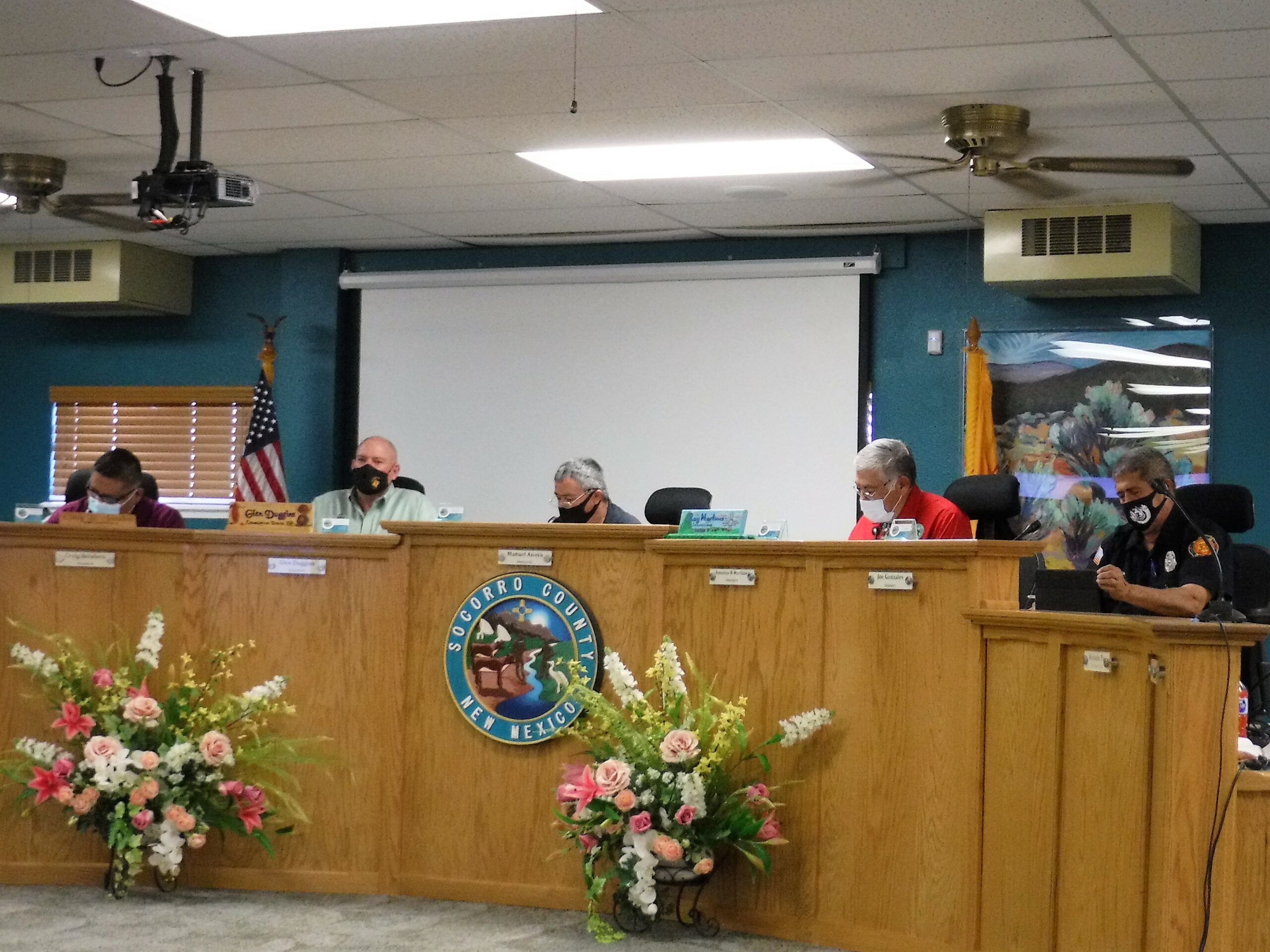
Socorro County Board of County Commissioners (from left): Craig Secatero, Glen Duggins, Manuel Anaya, Ray Martinez, Joe Gonzales
John Larson | El Defensor Chieftain
The Socorro County Board of County Commissioners has been vocal recently about legislation currently being considered in committee meetings which they say would result in problems for many of the county’s employees.
House Bill 4, known as New Mexico Civil Rights Act, will allow residents to file complaints in state District Courts against government agencies over violations of the New Mexico Bill of Rights. Currently, such cases are generally filed in federal courts, citing violations of the U.S. Constitution.
Senate Bill 376, Prohibit Defense of Qualified Immunity, currently being considered in the Senate Health and Public Affairs Committee, says basically the same as House Bill 4.
District 3 Commissioner and Commission Chairman Manuel Anaya said he was concerned about what negative impact HB 4 and SB 376 would have on the county, citing the removal of qualified immunity for law enforcement and selected county officials. Qualified immunity basically puts a cap on the amount for which someone working for a public body can be sued.
As used in the bill, “public body” means a state or local government, an advisory board, a commission, an agency or an entity created by the constitution of New Mexico or any branch of government that receives public funding, including political subdivisions, special tax districts, school districts and institutions of higher education.
In the case of a law enforcement officer, qualified immunity is a defense to standing civil trial. Law enforcement officers are entitled to qualified immunity when their actions do not violate a clearly established statutory or constitutional right.
Opponents of the bill say the idea behind qualified immunity is that the officers involved are acting in good faith and if it doesn’t turn out right, an officer may get punished for striving to do the right thing.
“There were a couple of changes to the bill, and one of them would to keep qualified immunity for judges and legislators who spend hours, days and weeks making decisions, but it will deny immunity to our sheriff deputies who have to make a decision in a split second,” Anaya said.
“Let’s not wait until this is already law, so please contact your legislator. This a bad deal and will really hurt us if it goes through.”
The worry is that the county or any local government won’t be able to afford the costs of lawsuits filed under the act.
County Manager Michael Hawkes told the Chieftain that he feared passage of the bill would make people have second thoughts about entering law enforcement.
“I cannot stress enough about the detrimental effects of this bill,” County Manager Michael Hawkes said in an interview with the Chieftain. “In part and parcel, it does away with qualified immunity for just about everybody. Say, if you’re law enforcement or a detention officer or even the county manager, and they name you in a court claim, you’re just as liable for punitive damages. If I wasn’t even at the scene, I’m open to punitive damages. So are all the other officers that might have been at the scene, but weren’t involved … well, they’re open to losing everything.
“Before, Risk Management capped what could be awarded. About a year ago I got wind of this and called Risk Management and asked if this goes, how was this going to affect our premiums,” Hawkes said. “And they laughed at me and said, ‘Mike, you won’t have any premiums because you won’t get an underwriter to issue any coverage.'”
Proponents believe the bill will “make the New Mexico Constitution more of a living document,” according to a statement by House Speaker Brian Egolf (D-Santa Fe). “Something that has greater meaning to the people of our state and will also hold public officials and public employees who commit misconduct and hold them accountable.”
Others have referred to qualified immunity as a “get-out-of-court free card,” and shield to misconduct.
The commission has also:
- Approved a grant agreement to fund the installation of solar panels at the detention center. “This is part of the Energy and Green Movement Socorro County’s involved in, trying to save costs on utilities,” Hawkes said. This is getting us closer to finishing this project. It’s pretty much ready to go. We need to introduce the project to Socorro Electric Cooperative for them to do their analysis and costs and then we can move forward.”
- Approved a request to allow Ken and Rosa Armijo to form a steering committee for the Sabinal Community Center. Hawkes said the Armijo’s donated the property the Sabinal center could be built on. “The process of the steering committee is to make sure that the Sabinal Community Center has the sustainability where they can find the means and mechanisms to raise funds in order to help pay the light bill and water and sewer and everything else,” he said. The Sabinal Community Center Committee is to be made up of five adult legal residents of Northern Socorro County qualified and selected based on their qualifications and desire to participate as a Committee Member on a voluntary basis selected and voted on by the County Commission.
- The Sheriff’s office reported that it provided security for the Clint Eastwood movie that was filmed in the Polvadera area. “Our office billed the company $28,320,” Sheriff William Armijo said. “The cost for our department was $14,043.99. The county profited $14,276.01 from these services.”


















